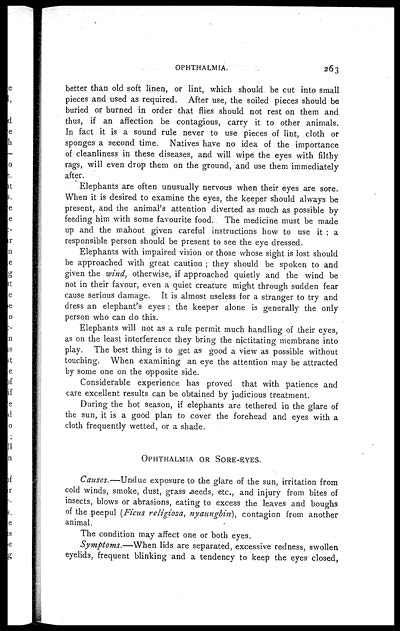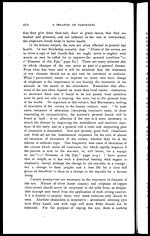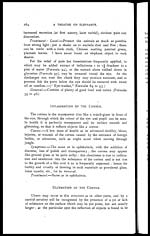Medicine - Veterinary > Veterinary diseases > Elephants and their diseases > Part IV - Non-infective diseases
(319) Page 263
Download files
Individual page:
Thumbnail gallery: Grid view | List view

OPHTHALMIA. 263
better than old soft linen, or lint, which should be cut into small
pieces and used as required. After use, the soiled pieces should be
buried or burned in order that flies should not rest on them and
thus, if an affection be contagious, carry it to other animals.
In fact it is a sound rule never to use pieces of lint, cloth or
sponges a second time. Natives have no idea of the importance
of cleanliness in these diseases, and will wipe the eyes with filthy
rags, will even drop them on the ground, and use them immediately
after.
Elephants are often unusually nervous when their eyes are sore.
When it is desired to examine the eyes, the keeper should always be
present, and the animal's attention diverted as much as possible by
feeding him with some favourite food.. The medicine must be made
up and the mahout given careful instructions how to use it ; a
responsible person should be present to see the eye dressed.
Elephants with impaired vision or those whose sight is lost should
be approached with great caution ; they should be spoken to and
given the wind, otherwise, if approached quietly and the wind be
not in their favour, even a quiet creature might through sudden fear
cause serious damage. It is almost useless for a stranger to try and
dress an elephant's eyes ; the keeper alone is generally the only
person who can do this.
Elephants will not as a rule permit much handling of their eyes,
as on the least interference they bring the nictitating membrane into
play. The best thing is to get as good a view as possible without
touching. When examining an eye the attention may be attracted
by some one on the opposite side.
Considerable experience has proved that with patience and
care excellent results can be obtained by judicious treatment.
During the hot season, if elephants are tethered in the glare of
the sun, it is a good plan to cover the forehead and eyes with a
cloth frequently wetted, or a shade.
OPHTHALMIA OR SORE-EYES.
Causes.—Undue exposure to the glare of the sun, irritation from
cold winds, smoke, dust, grass seeds, etc., and injury from bites of
insects, blows or abrasions, eating to excess the leaves and boughs
of the peepul (Ficus religiosa, nyaungbin), contagion from another
animal.
The condition may affect one or both eyes.
Symptoms.—When lids are separated, excessive redness, swollen
eyelids, frequent blinking and a tendency to keep the eyes closed,
Set display mode to: Large image | Zoom image | Transcription
Images and transcriptions on this page, including medium image downloads, may be used under the Creative Commons Attribution 4.0 International Licence unless otherwise stated. ![]()
| India Papers > Medicine - Veterinary > Veterinary diseases > Elephants and their diseases > Non-infective diseases > (319) Page 263 |
|---|
| Permanent URL | https://digital.nls.uk/75193017 |
|---|




